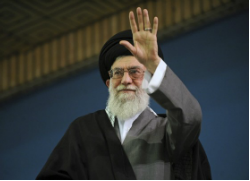
Some argue that the West is continually trying to find ways to contain Iran and their believed attempt to acquire nuclear weapons. Recent infighting shows that the country’s leadership may be splintering leading to a fissure in the Islamic Republic of Iran. Do these public confrontations present an opportunity for the West to find workable solutions to this issue?
The Iranian Supreme Leader Ayatollah Ali Khamenei is finding himself in new territory, wading into the internal political battles of Iran. Khamenei has been forced to respond to the ever more confrontational President Mahmoud Ahmadinejad. This conflict began in 2011 when Ahmadinejad challenged Khamenei over the appointment of a high-ranking intelligence ministry post. Since, Ahmadenejad has taken several other opportunities to raise tension between himself and the Supreme Leader, forcing several of Ahmadinejad’s political allies off the upcoming ballot. However, it seems that a significant majority of lawmakers are still loyal to Khamenei.
This conflict comes out of a contentious session of parliament. This session included several instances where Ahmadinejad and Iran’s legislative body frequently feuded publicly. This included the impeachment of the President’s labor minister. Also, Ahmadinejad accused a judiciary chief, and appointee of the Supreme Leader, of bribery. These public riffs come ahead of the June presidential election that will elect Ahmadinejad’s successor. Throughout this spat, Khamenei has called for calm, especially against the pressure of economic sanctions from the West.
This infighting comes in the face of renewed effort from the West in regards to Iran’s nuclear program. Last week Iran rejected negotiations with the United States. Khamenei proclaimed that if Iran wanted to build nuclear weapons, no country could stop them. The Supreme Leader insisted that before any negotiations will occur, the West must lift all sanctions because Iran will not surrender. After addressing the recent offer to negotiate, Khamenei transitioned into criticizing Ahmadinejad and the speaker of the Parliament.
There seems to be a split between the two most powerful men in Iran. Is now the time that the West may be able to leverage the divided leadership in order to reign in Iran?
Wesley Fry is a 3L and Managing Editor of the Denver Journal of International Law and Policy

